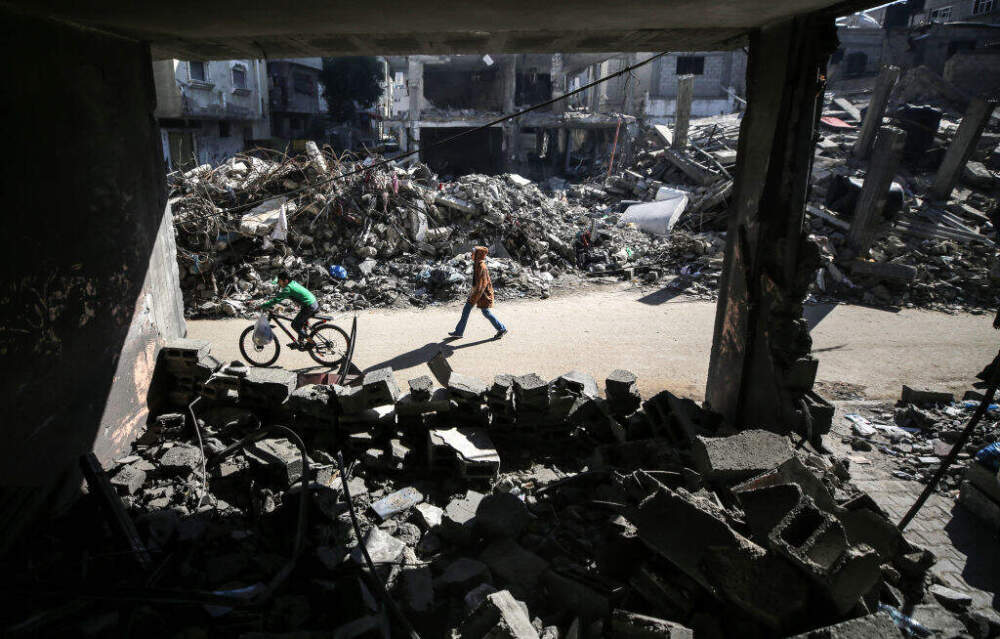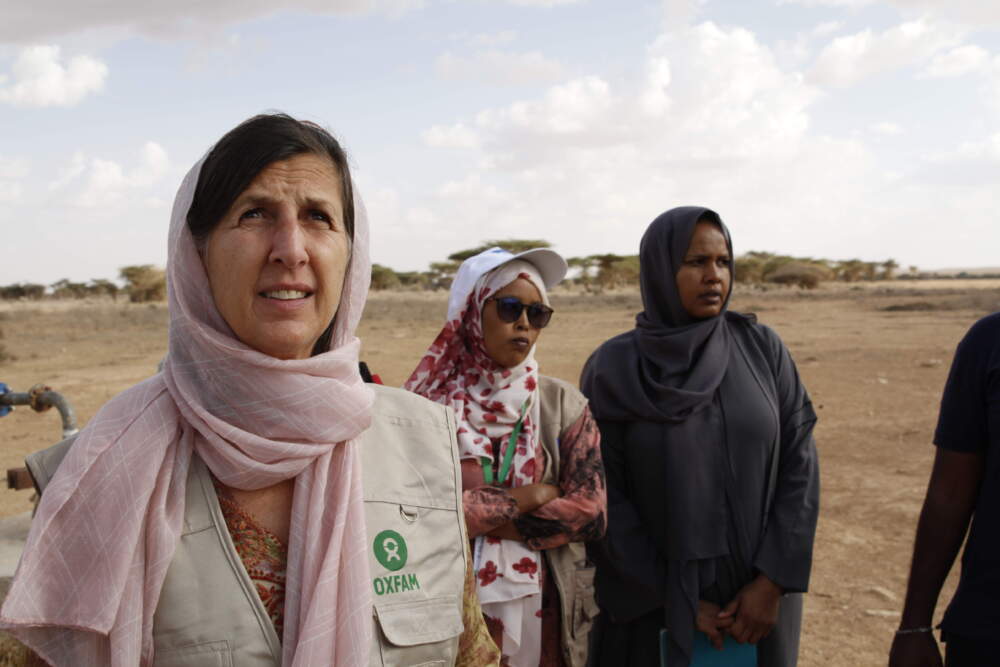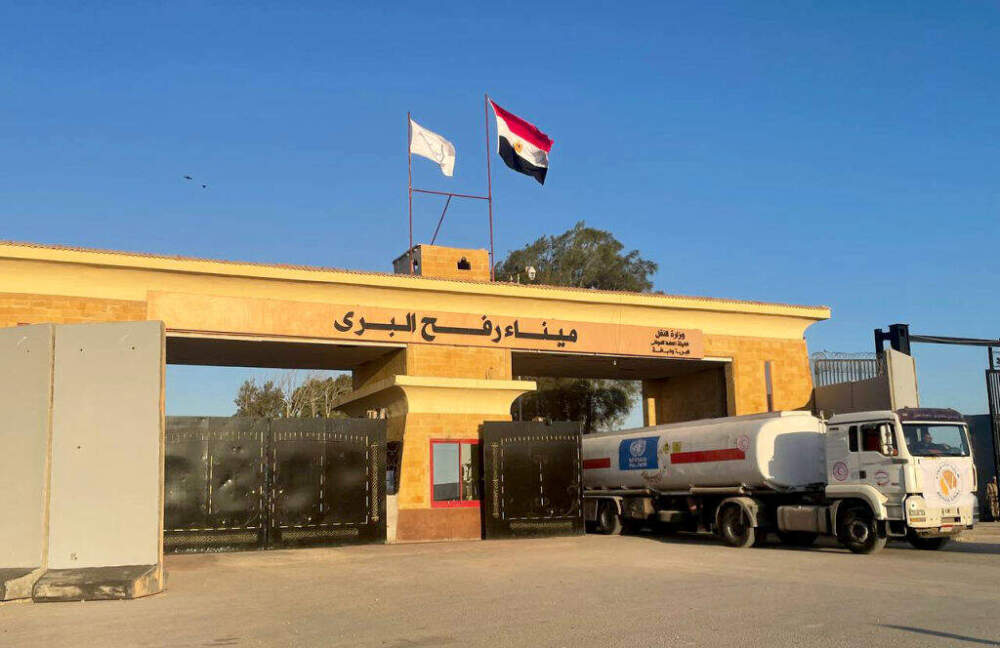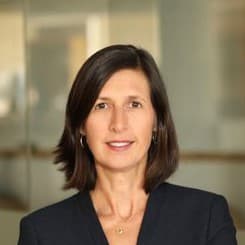Advertisement
Commentary
A humanitarian's plea: Hope must survive amidst the horror in Israel and Gaza

Editor's note: After the publication of this essay, the cease fire between Israel and Hamas collapsed.
On November 11, as news broke that Israeli troops had besieged Al Shifa hospital in Gaza — endangering the patients and civilians seeking treatment and refuge there — I hit a wall. I am a professional humanitarian. Today, I lead Oxfam America — an organization dedicated to fighting inequality, to ending poverty and injustice around the world — and I’ve spent my career working in disaster zones and fighting for the rights of marginalized people. My work has brought me to nearly 60 countries, and I’ve lived in many of them: from Ethiopia and Rwanda and Haiti to the Occupied Palestinian Territory and Israel.
But the current crisis in Israel and Gaza is unlike any other that I have experienced. Hearing of the attacks on medical centers and of babies left to die alone in al-Nasr Hospital during the forced evacuation, I have had moments where I’ll admit, even I’ve lost hope.
I took myself on a walk that day, to process and, honestly, to cry. Like so many others who care about human rights and our common humanity, I have been struggling with the new scale of suffering in the region since Hamas’s brutal attacks on Israeli civilians on October 7, when more than 1,200 were killed and hundreds more were taken hostage.

The recent cease fire has meant the return of some hostages, and the release of Palestinian detainees (many of whom are children). For this I am very grateful. But there are still so many waiting to return home.
Since the conflict began, more than 15,000 Palestinians in Gaza, including about 6,150 children, have been killed by relentless airstrikes and shelling by the Israeli military, according to the Government Media Office in Gaza.
More than 1.8 million Palestinians, nearly 80% of the Gazan population, have been displaced, with little to no water or food. Fuel has all but run out. Without medication, food, water and electricity, Gaza’s hospitals are collapsing, and patients — including infants — with treatable illnesses and injuries are dying.
The scale of humanitarian need is overwhelming, and what little aid that has recently been allowed to enter Gaza is but a drop in an ocean of need. It can feel hard to believe that there can ever be an end to this crisis.
That uncertainty, and creeping doubt, has me examining my own connection to this work, and the world.
I am a Jewish woman, who had the privilege of Quaker education. I do the work I do because my values and beliefs — grounded in my Jewish identity — compel me to. I believe that Israel is entitled to protect its people. And I also believe Israel must do so within the bounds of international law, and driven by the higher guiding principle taught by the Jewish religious leader Hillel: “What is hateful to you, do not do to your fellow human beings.”
At Oxfam, we are calling for a ceasefire to protect the Palestinian and Israeli civilians who are paying the price for the failures of their political leaders.
My commitment to this cause is strengthened by witnessing a robust and diverse coalition, including many Jewish voices, actively advocating for the liberation of all people. I have never been particularly religious, but being Jewish has always been a part of who I am — and it is particularly tied to my belief in social justice. I am from a family of immigrants who fled persecution in Belarus, Ukraine and Poland, which instilled in me the Jewish notion of tikkun olam, “repairing the world.” This belief guides my hope that, by lifting our voices together, we can still forge a path for peace, however difficult it may be.
As a professional, a humanitarian and the head of an aid organization, my most important job is to say loudly and clearly that aid under the current circumstances will never be close to enough. Humanitarian pauses are not enough.
For many people in Gaza, the pause in fighting (now in its sixth day) has only been a chance to fully assess how overwhelming the destruction is, and how difficult the path forward will be. The current pause must be a building block towards a permanent ceasefire, which is the only way to stop the suffering of families in Gaza and allow Oxfam, our partners and our peer organizations to significantly scale up our humanitarian response to meet the massive need by delivering more lifesaving aid, safely and securely.
I have to believe it is possible to hold the civilians on all sides of this conflict in my heart at the same time.
At Oxfam, we are calling for a ceasefire to protect the Palestinian and Israeli civilians who are paying the price for the failures of their political leaders. We call for the safe return of all the Israeli hostages taken on October 7, because civilians must never be used as political pawns. We call for the end to Israel’s siege of Gaza, to ensure that Gazans can access needed food, water, fuel and other essential goods needed to survive. And we call for a future solution and an end to the occupation rooted in the rights and dignity of all Israelis and Palestinians, where all of humanity is recognized and protected.

When I got home from my walk on November 11, I listened to a voice memo from one of my colleagues who lives in Gaza. (Oxfam has 30 staff who live and work there, plus three who made the agonizing decision to leave.) These aid workers themselves are living through this humanitarian crisis — many have fled their homes, lost family members, they’re hoping they won’t be killed. My colleague said:
“Last night was maybe the worst since the beginning of the war, but the thing is, we say that about each night. ‘This night is the worst.’ And then the next night comes and it’s even worse. We’re literally waiting for the bomb that’s going to kill us at any moment.”
There was horror in her voice, and fear.
If people like me — people who have dedicated their careers to peace — lose our hope and our determination to fight, who else will carry it forward? Who else will remind us of our common humanity?
I have to believe it is possible to hold the civilians on all sides of this conflict in my heart at the same time.
I am an optimist. In this crisis and all those I've worked on, there is always good — and it is only magnified in the harshest circumstances. I see it in neighbors and strangers offering each other shelter, and sharing what little they have. In people searching for others in the rubble, and carrying them to get medical care or to their families to mourn. In communities who may have different faiths, different identities, or different points of view, but have nevertheless joined together to call for peace and justice.
If those of us who commit our lives to fighting for justice can hold onto the goodness we see, then there is a path forward. I see the hostages returned home safely. I see a future for my colleagues in Gaza, where they and their families are not only safe, but can move freely, live in dignity, and dare to hope. I see the work of rebuilding, ensuring those who committed the most heinous crimes under international law are brought to justice, and forging new pathways for peace beginning.
President Biden and our government must do all it can to end this calamity now and secure an end to the fighting, because this vision of the future can only begin when hostilities end.
